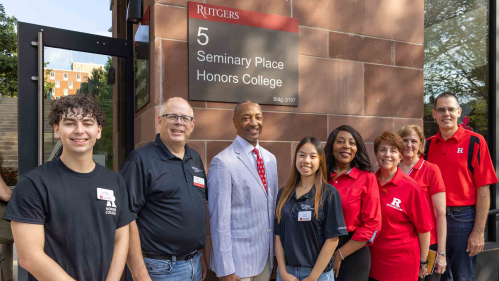Rutgers-New Brunswick Is Integrating Its Honors Communities

The unified Honors College opens its doors to a wider group of high-achieving students, offering a shared curriculum and expanded housing options
This semester, incoming honors students will be part of an integrated Honors College.
By uniting several honors communities – the Honors College, the Engineering Honors Academy, and honors programs at the School of Arts and Sciences and the School of Environmental and Biological Sciences – into one Honors College, Rutgers University-New Brunswick administrators aim to deliver a more enriching experience for high achieving students while preserving the legacy and strengths of each program.
“This will bring more than 950 entering, first-year honors students under a common learning-living setting of high-impact programs that are designed to enhance and enrich the academic experience of our most academically driven students,” said J.D. Bowers, dean of the Honors College.
We want students who want to be part of a thriving academic community, which means they have curiosity and they have interests across disciplines.
Charles Keeton
Vice Provost for Experiential Learning at Rutgers-New Brunswick
University administrators are consolidating specific honors programs and projects as well as offering others that were previously exclusive to a particular honors program. The result: More students can access mentorship, signature experiences and spaces designed to foster curiosity, collaboration and impact.
“We will have a richer, deeper and broader array of impact points and serve more students with great intensity,” said Bowers, adding that by the end of the process, which will unfold over several years, “we will impact roughly 10% of the undergraduates on our campus with an unparalleled program of honors learning and engagement.”
Under the integrated Honors College, more high-achieving students than ever can access the Rutgers Honors experience.
“We will have the ability to admit transfer students as well as select Rutgers sophomores who did not get in as first-year students but who came to Rutgers and established themselves as academic and co-curricular superstars,” said Bowers. “More students will now be eligible for many of the exclusive programs we have been offering just to students in the Honors College.”
There also will be expanded housing options for honors students who wish to live on campus and full commuter access to Honors College gathering spaces and experiences. More than half of the incoming honors class will live at 5 Seminary Place on the College Avenue campus. Other first-year and continuing honors students who choose to live on campus are placed in honors housing on Livingston, Busch, Cook and Douglass campuses, often close to where their major-related classes will be held. Student leaders, known as Honors Community Mentors, lead programs, generate discussions and help support students’ transition to college and connect them to the honors experience.

Another critical component of the integrated Honors College is community, said Charles Keeton, the Vice Provost for Experiential Learning at Rutgers-New Brunswick who previously served as academic dean of the School of Arts and Sciences honors program.
“We want students who want to be part of a thriving academic community, which means they have curiosity and they have interests across disciplines,” said Keeton, a professor within the Department of Physics and Astronomy.
Administrators said the integration will result in a larger audience for the Honors College’s Common Reading program, in which new students read a selected book intended to stir a community-wide discussion, and the newly launched LGBTQ+ Learning Collaborative, a program offering academic courses, research support and co-curricular and extra-curricular activities focused on LGBTQ+ issues and concerns and building a community of allies.
University administrators sought to take “the best features of all of them and combine them into a new whole,” said Keeton.
While the Honors College and other honors programs worked “very well” both independently and collectively, “the collective elements were seen as stronger and having untapped potential to positively affect more students, so it made sense to formally join forces and to enrich the entire honors student experience,” Bowers said.
This will bring more than 950 entering, first-year honors students under a common learning-living setting of high-impact programs that are designed to enhance and enrich the academic experience of our most academically driven students.
J.D. Bowers
Dean of the Honors College at Rutgers-New Brunswick
“From an admissions and recruitment standpoint, we were always struggling to make the distinctions between the two entities – the college and programs – and there was never any distinct academic level of achievement between the two sets of students,” Bowers added. “The determination was made that if we could still serve the students well in a consolidated arrangement, and possibly even better, there were few intellectual, co-curricular, institutional or academic reasons not to unify.”
“The Honors College at New Jersey’s flagship university chooses top students for opportunities, challenges, and experiences they find transformational,” said Rutgers-New Brunswick Chancellor Francine Conway. “We’re now taking the exciting next step of unifying our honors communities to expand their impact and distinction.”
Matt Esaia, an Honors College student who begins his senior year this fall, has been an Honors College ambassador since the spring semester of his first year. He said ambassadors from the Honors College and the honors programs are now a unified force, not separate.
Now a lead ambassador, Esaia and fellow ambassadors help organize and host events and tours highlighting the Honors College.
“We've had prospective students coming to events and asking us what's the difference between the honors program and the Honors College?” said Esaia, 20, who is majoring in mathematics, computer science and Italian. “And we really haven't been able to give them a strong answer because they were really similar.”

Esaia added, “Now that it's all one program, we can give a standardized answer. I think that some of the changes that we adopted are very positive for the students. If you have a commuter student that lives in New Brunswick, they don't have to pay all that money for housing on campus when they can commute to campus, which I think a lot of students will benefit from.”
During the transition, current students attending the Honors College or participating in the other honors programs at Rutgers-New Brunswick won’t face disruption or changes, administrators said. They added that while current honors students will have more opportunities for academic and social engagement, they also have the option to switch to the new honors curriculum if preferred.
Admission is based on a review of the student’s application, including academic strength and performance, extracurricular activities and the overall competitiveness of the applicant pool. Incoming students must apply by Dec. 1 to be considered for the Honors College.
“The merger is giving us a burst of energy and renewed focus, allowing us to connect with more stakeholders, supporters and friends, as well as energize a completely new set of students and families as to what the modern-day Rutgers University represents and presents,” said Bowers. “We have been, for some time, a destination institution. The greater presence and promotion of an honors experience like the one we are putting into place will ensure that we continue to be so for some of the state’s and the nation’s most talented students.”
Information on the integrated Honors College is available on its undergraduate admissions web page.






